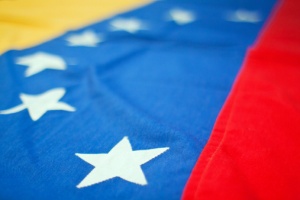Written in Fall/Winter 2005
La Raza Student Cultural Center Newsletter
By: Anthony Carranza
The landscape is green, mountainous, and the windy breeze blows over the valley. Everywhere you gaze you see endless beauty. You wake up and hear ceaseless shrieks and roars from Guacharacas, a fruit eating nocturnal bird. But unfortunately the happiness ends here.
Today, the reality is much harsher for Venezuelans to seek stable living conditions. Under the hand of President Hugo Chavez, in the midst of a social turmoil the country is latently divided into two groups.
Since his arrival in 1998, Venezuela has experienced protests, strikes, and riots nationally. Not because of the political agenda he beset, rather tha there was no cohesive plan to unite the Venezuelan citizens. The country had poverty levels that exceed 80 percent, and the remainin is middle and upper class. Moreover the few who have economic resources leave to seek work or study abroad.
Becausse of this, many Venezuelans have traveled to distant faraway places, including Minnesota.
According to the 2000 census, there were 470 Venezuelans currently living in the Twin Cities. That number has perhaps grown since recent events in Venezuela. Initially anybody can assert that immigrating to a foreign country will have its challenges. The tradition, culture and customs are likely to be gloomed by the presence of a new and unknown culture.
A Venezuelan student currently at the University of Minnesota Daniela Burgos Ojeda points out “I was born in Texas, but raised in Venezuela. I found it surprising how individualistic the society is in comparison to our own communities. We are filled with warmth and carry an optimistic attitude regardless of any situation.”
Burgos-Ojeda came to the University of Minnesota because of the lack in resources in technology for the field of Bio-science in Venezuela.
Burgos has set some longterm goals now, but hopes that maybe her country will improve its political crisis. She plans to move back someday to see her family again.
Beyond this another citizen of the country may transfer to the University. Peter Sabatini, computer science major, has been in Minnesota for three years now. He feels intrigues and says, “I did not feel Venezuelan completely, though I grew up like one. A lot has to do with the reality that my father is from Argentina and my mother from Peri. The traditional setting was heterogeneous.”
Sabatini added, “Now that I moved here I identified more with Venezuelans because I was away from home.”
One Venezuelan woman says she admisred her country’s understanding of its folklore, no matter their social or economic class. She says she has met knowledgeable people without formal education who knew history like the back of their hand.
One native Venezuelan says he appreciates Minnesota’s scenery. Armando Nunez, Assistant Chef at Chipotle added “I really enjoy the different views in Minnesota. So many lakes it is breathtaking. He is also a baseball fan, what he says is an important part of the Venezuelan culture, “We can compete. We have a great roster of Venezuelan players that are on the Minnesota Twins team.”
Nunez says he comes from a less resourceful environment. But it worth saying he has a passion for cooking and hopes one day he can start his own restaurant and bring his family to Minnesota. Nunez says he has not seen his son because of the economic hardship Venezuela is enduring.
When aske what would be a good representation readers should carry in thir minds about Venezuelans, each interviewee, all from different cities within the country, reponded similarly. Everyone should know who Simo Bolivar is. He was our libertator that freed us from Spanish control, and gave us a rich self-identity.
